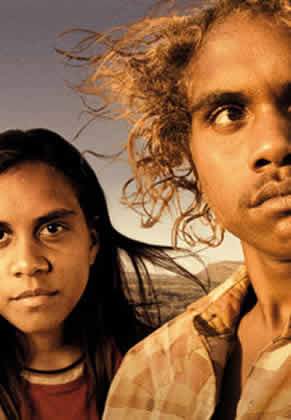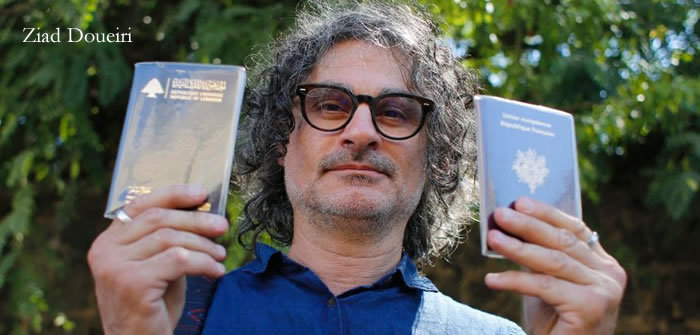A love story of survival, SAMSON & DELILAH is a coming-of-age story of two 14 year-olds from a sleepy Aboriginal community who escape their lives to discover the world outside.
“Samson and Delilah” triumphed at the recent Australian Film Industry Awards. The film won Best Film, Best Direction, Best Original Screenplay and Marissa Gibson and Rowan McNamara jointly won Best Young Talent.
The film is Warwick Thornton’s his feature debut, and is considered to be a major breakthrough in Australian cinema in a local industry dominated by non-indigenous filmmakers; some have said that “Samson & Delilah” it is “the first Australian film yet made”.
Thornton is a graduate of Screen Australia’s Indigenous Initiative which is compromised of a group of Indigenous film and video practitioners established in 1993 under the former Australian Film Commission. The Initiative is committed to promoting Indigenous screen  developments and opportunities and has four divisions: screen sales, production and finance, training and employment, policy and screen culture. Thornton was groomed through the program beginning with his award winning short films: Nana (2008 Crystal Bear winner at Berlin FF); Green Bush (2005 Panorama Short Film Award, Berlin FF) in addition to Mimi (2002). Screen Australia also provided support for “Samson & Delilah.” Warwick started his career as a cinematographer (he graduated from AFTRS in 1997) and he continues to shoot for other people while developing and making his own projects. Most recently he shot several episodes of the First Australians SBS documentary series. Warwick has also shot and directed many other documentaries for CAAMA Productions and the national broadcasters – ABC and SBS. Thornton is currently working on a 3 hour documentary series with Aboriginal art curator Hetti Perkins, produced by Bridget Ikin (An Angel at My Table, My Year without Sex), called Art and Soul.
developments and opportunities and has four divisions: screen sales, production and finance, training and employment, policy and screen culture. Thornton was groomed through the program beginning with his award winning short films: Nana (2008 Crystal Bear winner at Berlin FF); Green Bush (2005 Panorama Short Film Award, Berlin FF) in addition to Mimi (2002). Screen Australia also provided support for “Samson & Delilah.” Warwick started his career as a cinematographer (he graduated from AFTRS in 1997) and he continues to shoot for other people while developing and making his own projects. Most recently he shot several episodes of the First Australians SBS documentary series. Warwick has also shot and directed many other documentaries for CAAMA Productions and the national broadcasters – ABC and SBS. Thornton is currently working on a 3 hour documentary series with Aboriginal art curator Hetti Perkins, produced by Bridget Ikin (An Angel at My Table, My Year without Sex), called Art and Soul.
Bijan Tehrani: Your film Samson and Delilah is a very different type of cinema in comparison to traditional world cinema in terms of the story and characters. How did you come up with this story and how did you go about creating the characters?
Warwick Thornton: You get an opportunity to make your first feature film and you have to ask yourself, do I have something to say? And is it worth saying. Do you want to make a film to go to Hollywood or do you want to make a film that will help change the world. I grew up in Alice Springs; I grew up on the streets because I didn’t like school very much. I decided to write a story that was very personal and important for me. That was the beginning; I wanted to make a love story about the two beautiful kids growing up in central Australia.
BT: Did you have the script ready before shooting, or did you make changes to the script as you went along?
WT: There’s no real dialogue in the film, I have an 80 page script that has all of the nuances in the film. Even though the film has no dialogue, everything in the film is written so I needed to keep that script.
 BT: For audiences outside Australia, this is a very shocking film, because they were not aware that a world like this exists in Australia. How has the reaction been in Australia?
BT: For audiences outside Australia, this is a very shocking film, because they were not aware that a world like this exists in Australia. How has the reaction been in Australia?
WT: It’s nowhere near as shocking as all of those crap Hollywood horror films like Saw where they torture and kill women, but yet they are shocked at the idea of two kids living in central Australia, it is very bizarre. You don’t hear about this world because the tourists want to just come and pet the kangaroos; all of the indigenous issues are kind of swept under the rocks. This is why we make films, so that people can come to cinema and experience a different world or a completely different planet.
BT: How did you work with the actors in the film, were they allowed to improvise?
WT: They weren’t free to improvise; we had an 80 page script. I’m like a grumpy uncle to them. People gave me money to make this film so I had to make it work. That kind of freedom doesn’t fit into the way that I work; improvisation can be kind of annoying to me. Everything is written, the distance between them and the love, and if you don’t stick to the script you can make a complete mess of the story.
BT: How did you go about casting the film?
WT: It’s bizarre, Rowan was the boy to walk in when we were auditioning; but we went to schools and communities around Alice Springs and talked to people about what we were looking for. This young boy Samson who is kind of cheeky with crazy hair, and the young girl Delilah who is sort of like mother earth and very strong with her walk; we would meet with their parents and just audition kids until we found the right ones.
BT: How did you come up with the visual style of the film?
WT: Its realism, I wanted the feeling that this was really happening. As an audience member you get the impression that you are really standing next to these kids. We didn’t mess around with the colors too much, when we lit anything we wanted to make sure that it didn’t seem like we lit it; not everyone gets a “back light” in real life. 
BT: I feel that the film has a very dark touch of humor in it, and overall it is a very dark film. Would you agree with that?
WT: Yeah, honesty and truth is the only place to go. I couldn’t make this film if it was all singing and dancing, it wouldn’t be very real to me. So it is a dark film, but the cinema is a lie that tells the truth so it is incredibly important to tell this story.
BT: How have the local people reacted to the film?
WT: They love it, its funny because they laughed at all of the little scary bits, there may be some who don’t like it, but I haven’t heard.
BT: Do you have any future project lined up?
WT: Yeah I’m doing a documentary series, we have shot it all but we won’t be releasing it until March. I have a feature film to shoot for my wife, and I am also on my third draft on my feature film called Father and Son, I hope to finish it next year and shoot it in 2011.
BT: It’s interesting that your film is representing Australia in the academy awards for best foreign language film. What do you think of the film’s chances?
WT: I have no idea, it’s very exciting. We have come a long way; it would be nice to be nominated and will definitely make it easier to make films later.
BT: Are they any filmmakers that you consider yourself a fan of, or who have influenced you? Are there any films that you have seen recently that you really enjoyed?
WT: You kind of change your mind because filmmakers make really good films and then they make really bad ones, so you never know. I’ve liked a lot of films recently; I love the films that Terrence Malik has done. There are just too many to name, I guess it depends on what time of the day it is.
BT: Thank you for your time and I wish you the best of luck with the academy awards.
WT: We’ll see what happens, we’re just trying to be positive and happy; we hope that it makes a change.

